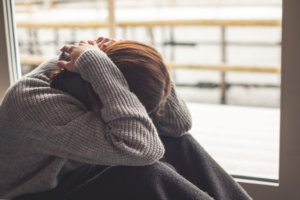You Feel Anxious Every Day, What Can You Do About It?


Written and verified by the psychologist Valeria Sabater
“I feel anxious every day. I live in a never-ending state of complete confusion with threatening thoughts and pressure in my chest that stops me from breathing.” Does this sound like you? As a matter of fact, many people describe this kind of psychophysical reality. It’s both grueling and exhausting. Furthermore, in these circumstances, it’s really difficult to be productive, maintain a relationship, and even find the courage to get up every morning.
Some describe this state as being as if someone suddenly flipped a switch. In fact, you can go from being calm to completely overwhelmed in an instant. In addition, you experience tachycardia, your emotions are disrupted, and you start to worry.
Anxiety is a normal physical and mental state. However, a problem occurs when it exceeds your abilities to manage it. It’s like driving a car, and suddenly feeling like the steering isn’t working. The world speeds up, along with your anxiety and the feeling that something terrible’s going to happen. You need to understand that, when you experience this kind of state on a daily basis, you may be facing a more complex psychological condition. Let’s take a look.
Generalized anxiety is a stable condition over time that affects many people’s lives.

Why do you feel anxious every day?
In reality, everyone feels a certain kind of anxiety on a day-to-day basis. Indeed, our fast-paced life often means we experience shortness of breath, knotted feelings in the stomach, and general feelings of pressure. We tend to be pretty familiar with these feelings. They’re experiences that we can control and that disappear when we relax and enjoy moments of leisure.
However, maybe you feel unable to rest, think clearly, and enjoy life because your anxiety is persistent and makes everything in your life look dark. Certain of your thoughts may have become intrusive and threatening. Furthermore, you feel constantly tired and suffer from insomnia. Tomorrow seems simply full of threats, health concerns, work worries, the future, and other things that may or may not even happen.
In fact, life itself becomes a suffocating tangle of anguish, even though you know that everything you fear is unjustified. Why is this happening? How is it possible to suffer from such persistent anxiety?
Generalized anxiety, as common as it’s neglected
Generalized anxiety disorder (GAD) is a stable psychological condition over time. In many cases, it starts as early as adolescence. As a matter of fact, it’s probably this reality that’s behind the question of why you feel anxious every day.
This disorder completely conditions your life. Furthermore, many people suffer in silence without even receiving a diagnosis. As a matter of fact, sometimes, this way of thinking and reacting to things is assumed to be a personality trait.
In reality, this is a disorder as prevalent as it’s serious. In fact, the University of Sherbrooke (Canada) conducted a study that discovered, in many cases, depression appears alongside generalized anxiety disorder.
According to the Diagnostic and Statistical Manual of Mental Disorders (DSM-5) the characteristics that define this type of anxiety are:
- A fluctuating and chronic development of the disorder. In other words, it goes away sometimes but always comes back. Furthermore, it’s worse at times of stress.
- The appearance of persistent worries that are difficult to control.
- Other clinical problems appear alongside, such as phobias, depression, and panic disorders.
- Feelings of exhaustion almost every day.
- Rest disturbances.
- Concentration problems.
- Somatizations such as headaches, dizziness, digestive problems, tachycardias, etc.
Therefore, if you’re wondering why you feel anxious every day, you’re probably suffering the physical effects of this disorder. This means your quality of life is greatly reduced.
People with generalized anxiety have family, work, and social problems. In addition, they tend to visit the doctor many times given their wide physical symptoms.

Feeling anxious every day: what can you do?
If you feel anxious every day, you must understand that you can’t carry on like this. In fact, you need to ask for specialized help. You have to understand that this clinical condition leads, in many cases, to major depression and you really don’t want to reach that extreme.
You also must take into account that this condition is the result of multiple factors. These may include genetic elements and psychological trauma.
Rather than asking “why is this happening to me?” focus on the “what can I do about it?”. The most appropriate strategy is psychotherapy and pharmacological treatment. In the latter case, the most commonly prescribed medications are antidepressants and benzodiazepines.
- With regard to the psychological approach, the most common and effective therapy is cognitive-behavioral. In this kind of therapy, the interaction between your thoughts, emotions, and those behaviors that reinforce your anxiety are worked on.
- ACT Therapy can also be useful. It allows you to manage your anxious thoughts, accept/understand uncomfortable sensations, and the complexity of life. In turn, you can clarify your values and engage with your goals to develop a more meaningful lifestyle.
Finally, it must be remembered that each individual’s reality is different. For this reason, the treatment and therapeutic approach used will also be different in each individual case. Generalized anxiety is a complex condition. Therefore a high level of commitment is required to understand the disorder, get through it, and overcome it.
“I feel anxious every day. I live in a never-ending state of complete confusion with threatening thoughts and pressure in my chest that stops me from breathing.” Does this sound like you? As a matter of fact, many people describe this kind of psychophysical reality. It’s both grueling and exhausting. Furthermore, in these circumstances, it’s really difficult to be productive, maintain a relationship, and even find the courage to get up every morning.
Some describe this state as being as if someone suddenly flipped a switch. In fact, you can go from being calm to completely overwhelmed in an instant. In addition, you experience tachycardia, your emotions are disrupted, and you start to worry.
Anxiety is a normal physical and mental state. However, a problem occurs when it exceeds your abilities to manage it. It’s like driving a car, and suddenly feeling like the steering isn’t working. The world speeds up, along with your anxiety and the feeling that something terrible’s going to happen. You need to understand that, when you experience this kind of state on a daily basis, you may be facing a more complex psychological condition. Let’s take a look.
Generalized anxiety is a stable condition over time that affects many people’s lives.

Why do you feel anxious every day?
In reality, everyone feels a certain kind of anxiety on a day-to-day basis. Indeed, our fast-paced life often means we experience shortness of breath, knotted feelings in the stomach, and general feelings of pressure. We tend to be pretty familiar with these feelings. They’re experiences that we can control and that disappear when we relax and enjoy moments of leisure.
However, maybe you feel unable to rest, think clearly, and enjoy life because your anxiety is persistent and makes everything in your life look dark. Certain of your thoughts may have become intrusive and threatening. Furthermore, you feel constantly tired and suffer from insomnia. Tomorrow seems simply full of threats, health concerns, work worries, the future, and other things that may or may not even happen.
In fact, life itself becomes a suffocating tangle of anguish, even though you know that everything you fear is unjustified. Why is this happening? How is it possible to suffer from such persistent anxiety?
Generalized anxiety, as common as it’s neglected
Generalized anxiety disorder (GAD) is a stable psychological condition over time. In many cases, it starts as early as adolescence. As a matter of fact, it’s probably this reality that’s behind the question of why you feel anxious every day.
This disorder completely conditions your life. Furthermore, many people suffer in silence without even receiving a diagnosis. As a matter of fact, sometimes, this way of thinking and reacting to things is assumed to be a personality trait.
In reality, this is a disorder as prevalent as it’s serious. In fact, the University of Sherbrooke (Canada) conducted a study that discovered, in many cases, depression appears alongside generalized anxiety disorder.
According to the Diagnostic and Statistical Manual of Mental Disorders (DSM-5) the characteristics that define this type of anxiety are:
- A fluctuating and chronic development of the disorder. In other words, it goes away sometimes but always comes back. Furthermore, it’s worse at times of stress.
- The appearance of persistent worries that are difficult to control.
- Other clinical problems appear alongside, such as phobias, depression, and panic disorders.
- Feelings of exhaustion almost every day.
- Rest disturbances.
- Concentration problems.
- Somatizations such as headaches, dizziness, digestive problems, tachycardias, etc.
Therefore, if you’re wondering why you feel anxious every day, you’re probably suffering the physical effects of this disorder. This means your quality of life is greatly reduced.
People with generalized anxiety have family, work, and social problems. In addition, they tend to visit the doctor many times given their wide physical symptoms.

Feeling anxious every day: what can you do?
If you feel anxious every day, you must understand that you can’t carry on like this. In fact, you need to ask for specialized help. You have to understand that this clinical condition leads, in many cases, to major depression and you really don’t want to reach that extreme.
You also must take into account that this condition is the result of multiple factors. These may include genetic elements and psychological trauma.
Rather than asking “why is this happening to me?” focus on the “what can I do about it?”. The most appropriate strategy is psychotherapy and pharmacological treatment. In the latter case, the most commonly prescribed medications are antidepressants and benzodiazepines.
- With regard to the psychological approach, the most common and effective therapy is cognitive-behavioral. In this kind of therapy, the interaction between your thoughts, emotions, and those behaviors that reinforce your anxiety are worked on.
- ACT Therapy can also be useful. It allows you to manage your anxious thoughts, accept/understand uncomfortable sensations, and the complexity of life. In turn, you can clarify your values and engage with your goals to develop a more meaningful lifestyle.
Finally, it must be remembered that each individual’s reality is different. For this reason, the treatment and therapeutic approach used will also be different in each individual case. Generalized anxiety is a complex condition. Therefore a high level of commitment is required to understand the disorder, get through it, and overcome it.
All cited sources were thoroughly reviewed by our team to ensure their quality, reliability, currency, and validity. The bibliography of this article was considered reliable and of academic or scientific accuracy.
- Haller H, Cramer H, Lauche R, et al. The prevalence and burden of subthreshold generalized anxiety disorder: A systematic review. BMC Psychiatry. 2014;14:128 doi:10.1186/1471-244X-14-128
- Locke AB, Kirst N, Shultz CG. Diagnosis and management of generalized anxiety disorder and panic disorder in adults. Am Fam Physician. 2015;91(9):617-624.
- Roberge, P., Normand-Lauzière, F., Raymond, I. et al. Generalized anxiety disorder in primary care: mental health services use and treatment adequacy. BMC Fam Pract 16,146 (2015). https://doi.org/10.1186/s12875-015-0358-y
- Rubio G, López-Ibor JJ. Generalized anxiety disorder: a 40-year follow-up study. Acta Psychiatr Scand. 2007 May;115(5):372-9. doi: 10.1111/j.1600-0447.2006.00896.x. PMID: 17430415.
This text is provided for informational purposes only and does not replace consultation with a professional. If in doubt, consult your specialist.







